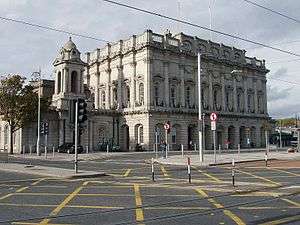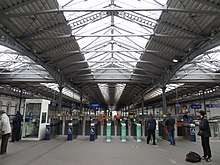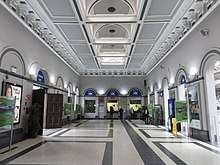Heuston railway station
Heuston Station (/ˈhjuːstən/ HEW-stən; Irish: Stáisiún Heuston; formerly Kingsbridge Station) also known as Dublin Heuston, is one of Ireland's main railway stations, linking the capital with the south, southwest and west. It is operated by Iarnród Éireann (IÉ), the national railway operator. It also houses the head office of its parent company - Córas Iompair Éireann (CIÉ).[3] The station is named in honour of Seán Heuston, an executed leader of the 1916 Easter Rising, who had worked in the station's offices.
 The station in late 2006 | |||||||||||||||||||||||||||||||||||||||||||||||||||||||||||||
| Location | St John's Road West Dublin 8 D08 E2CV Ireland | ||||||||||||||||||||||||||||||||||||||||||||||||||||||||||||
| Coordinates | 53.3465°N 6.2925°W | ||||||||||||||||||||||||||||||||||||||||||||||||||||||||||||
| Owned by | Iarnród Éireann | ||||||||||||||||||||||||||||||||||||||||||||||||||||||||||||
| Operated by | Iarnród Éireann | ||||||||||||||||||||||||||||||||||||||||||||||||||||||||||||
| Platforms | 9 | ||||||||||||||||||||||||||||||||||||||||||||||||||||||||||||
| Bus routes |
| ||||||||||||||||||||||||||||||||||||||||||||||||||||||||||||
| Bus operators | Dublin Bus | ||||||||||||||||||||||||||||||||||||||||||||||||||||||||||||
| Connections | Luas Red Line | ||||||||||||||||||||||||||||||||||||||||||||||||||||||||||||
| Construction | |||||||||||||||||||||||||||||||||||||||||||||||||||||||||||||
| Structure type | At-grade | ||||||||||||||||||||||||||||||||||||||||||||||||||||||||||||
| Parking | Yes | ||||||||||||||||||||||||||||||||||||||||||||||||||||||||||||
| Architect | Sancton Wood (terminal) John MacNeill (train shed)[1][2] | ||||||||||||||||||||||||||||||||||||||||||||||||||||||||||||
| Other information | |||||||||||||||||||||||||||||||||||||||||||||||||||||||||||||
| Station code | HSTON | ||||||||||||||||||||||||||||||||||||||||||||||||||||||||||||
| Fare zone | Suburban 1 | ||||||||||||||||||||||||||||||||||||||||||||||||||||||||||||
| History | |||||||||||||||||||||||||||||||||||||||||||||||||||||||||||||
| Opened | 4 August 1846 | ||||||||||||||||||||||||||||||||||||||||||||||||||||||||||||
| Electrified | No | ||||||||||||||||||||||||||||||||||||||||||||||||||||||||||||
| Original company | Great Southern and Western Railway | ||||||||||||||||||||||||||||||||||||||||||||||||||||||||||||
| Pre-grouping | Great Southern and Western Railway | ||||||||||||||||||||||||||||||||||||||||||||||||||||||||||||
| Post-grouping | Great Southern Railways | ||||||||||||||||||||||||||||||||||||||||||||||||||||||||||||
| Key dates | |||||||||||||||||||||||||||||||||||||||||||||||||||||||||||||
| 1846 | Station opened as Kingsbridge Station | ||||||||||||||||||||||||||||||||||||||||||||||||||||||||||||
| 1966 | Renamed as Heuston Station | ||||||||||||||||||||||||||||||||||||||||||||||||||||||||||||
| 1998, 2004 and 2005 | Station refurbished and partially rebuilt | ||||||||||||||||||||||||||||||||||||||||||||||||||||||||||||
| |||||||||||||||||||||||||||||||||||||||||||||||||||||||||||||
Dublin to Cork | |||||||||||||||||||||||||||||||||||||||||||||||||||||||||||||||||||||||||||||||||||||||||||||||||||||||||||||||||||||||||||||||||||||||||||||||||||||||||||||||||||||||||||||||||||||||||||||||||||||||||||||||||||||||||||||||||||||||||||||||||||||||||||||||||||||||||||||||||||||||||||||||||||||||||||||||||||||||||||||||||||||||||||||||||||||||||||||||||||||||||||||||||||
|---|---|---|---|---|---|---|---|---|---|---|---|---|---|---|---|---|---|---|---|---|---|---|---|---|---|---|---|---|---|---|---|---|---|---|---|---|---|---|---|---|---|---|---|---|---|---|---|---|---|---|---|---|---|---|---|---|---|---|---|---|---|---|---|---|---|---|---|---|---|---|---|---|---|---|---|---|---|---|---|---|---|---|---|---|---|---|---|---|---|---|---|---|---|---|---|---|---|---|---|---|---|---|---|---|---|---|---|---|---|---|---|---|---|---|---|---|---|---|---|---|---|---|---|---|---|---|---|---|---|---|---|---|---|---|---|---|---|---|---|---|---|---|---|---|---|---|---|---|---|---|---|---|---|---|---|---|---|---|---|---|---|---|---|---|---|---|---|---|---|---|---|---|---|---|---|---|---|---|---|---|---|---|---|---|---|---|---|---|---|---|---|---|---|---|---|---|---|---|---|---|---|---|---|---|---|---|---|---|---|---|---|---|---|---|---|---|---|---|---|---|---|---|---|---|---|---|---|---|---|---|---|---|---|---|---|---|---|---|---|---|---|---|---|---|---|---|---|---|---|---|---|---|---|---|---|---|---|---|---|---|---|---|---|---|---|---|---|---|---|---|---|---|---|---|---|---|---|---|---|---|---|---|---|---|---|---|---|---|---|---|---|---|---|---|---|---|---|---|---|---|---|---|---|---|---|---|---|---|---|---|---|---|---|---|---|---|---|---|---|---|---|---|---|---|---|---|---|---|---|---|---|---|---|---|---|---|---|---|---|---|---|---|---|---|---|---|---|---|---|---|---|---|---|---|---|---|---|---|---|---|---|---|---|---|---|---|---|---|---|---|---|
| |||||||||||||||||||||||||||||||||||||||||||||||||||||||||||||||||||||||||||||||||||||||||||||||||||||||||||||||||||||||||||||||||||||||||||||||||||||||||||||||||||||||||||||||||||||||||||||||||||||||||||||||||||||||||||||||||||||||||||||||||||||||||||||||||||||||||||||||||||||||||||||||||||||||||||||||||||||||||||||||||||||||||||||||||||||||||||||||||||||||||||||||||||
Dublin to Galway/Westport | |||||||||||||||||||||||||||||||||||||||||||||||||||||||||||||||||||||||||||||||||||||||||||||||||||||||||||||||||||||||||||||||||||||||||||||||||||||||||||||||||||||||||||||||||||||||||||||||||||||||||||||||||||||||||||||||||||||||||||||||||||||||||||||||||||||||||||||||||||||||||||||||||||||||||||||||||||||||||||||||||||||||||||||||||
|---|---|---|---|---|---|---|---|---|---|---|---|---|---|---|---|---|---|---|---|---|---|---|---|---|---|---|---|---|---|---|---|---|---|---|---|---|---|---|---|---|---|---|---|---|---|---|---|---|---|---|---|---|---|---|---|---|---|---|---|---|---|---|---|---|---|---|---|---|---|---|---|---|---|---|---|---|---|---|---|---|---|---|---|---|---|---|---|---|---|---|---|---|---|---|---|---|---|---|---|---|---|---|---|---|---|---|---|---|---|---|---|---|---|---|---|---|---|---|---|---|---|---|---|---|---|---|---|---|---|---|---|---|---|---|---|---|---|---|---|---|---|---|---|---|---|---|---|---|---|---|---|---|---|---|---|---|---|---|---|---|---|---|---|---|---|---|---|---|---|---|---|---|---|---|---|---|---|---|---|---|---|---|---|---|---|---|---|---|---|---|---|---|---|---|---|---|---|---|---|---|---|---|---|---|---|---|---|---|---|---|---|---|---|---|---|---|---|---|---|---|---|---|---|---|---|---|---|---|---|---|---|---|---|---|---|---|---|---|---|---|---|---|---|---|---|---|---|---|---|---|---|---|---|---|---|---|---|---|---|---|---|---|---|---|---|---|---|---|---|---|---|---|---|---|---|---|---|---|---|---|---|---|---|---|---|---|---|---|---|---|---|---|---|---|---|---|---|---|---|---|---|---|---|---|---|---|---|---|---|---|---|---|---|---|---|---|---|---|---|---|---|---|---|---|---|---|---|---|---|---|---|---|---|---|---|---|---|
| |||||||||||||||||||||||||||||||||||||||||||||||||||||||||||||||||||||||||||||||||||||||||||||||||||||||||||||||||||||||||||||||||||||||||||||||||||||||||||||||||||||||||||||||||||||||||||||||||||||||||||||||||||||||||||||||||||||||||||||||||||||||||||||||||||||||||||||||||||||||||||||||||||||||||||||||||||||||||||||||||||||||||||||||||
Dublin–Waterford | |||||||||||||||||||||||||||||||||||||||||||||||||||||||||||||||||||||||||||||||||||||||||||||||||||||||||||||||||||||||||||||||||||||||||||||||||||||||||||||||||||||||||||||||||||||||||||||||||||||||||||||||||||||||||||||||||||||||||||||||||||||||||||||||||||||||||||||||||||||||||||||||||||||||||||||||||||||||||||||||||||||||||
|---|---|---|---|---|---|---|---|---|---|---|---|---|---|---|---|---|---|---|---|---|---|---|---|---|---|---|---|---|---|---|---|---|---|---|---|---|---|---|---|---|---|---|---|---|---|---|---|---|---|---|---|---|---|---|---|---|---|---|---|---|---|---|---|---|---|---|---|---|---|---|---|---|---|---|---|---|---|---|---|---|---|---|---|---|---|---|---|---|---|---|---|---|---|---|---|---|---|---|---|---|---|---|---|---|---|---|---|---|---|---|---|---|---|---|---|---|---|---|---|---|---|---|---|---|---|---|---|---|---|---|---|---|---|---|---|---|---|---|---|---|---|---|---|---|---|---|---|---|---|---|---|---|---|---|---|---|---|---|---|---|---|---|---|---|---|---|---|---|---|---|---|---|---|---|---|---|---|---|---|---|---|---|---|---|---|---|---|---|---|---|---|---|---|---|---|---|---|---|---|---|---|---|---|---|---|---|---|---|---|---|---|---|---|---|---|---|---|---|---|---|---|---|---|---|---|---|---|---|---|---|---|---|---|---|---|---|---|---|---|---|---|---|---|---|---|---|---|---|---|---|---|---|---|---|---|---|---|---|---|---|---|---|---|---|---|---|---|---|---|---|---|---|---|---|---|---|---|---|---|---|---|---|---|---|---|---|---|---|---|---|---|---|---|---|---|---|---|---|---|---|---|---|---|---|---|---|---|---|---|---|---|---|---|---|---|---|---|---|---|---|---|---|---|---|---|---|---|---|---|
| |||||||||||||||||||||||||||||||||||||||||||||||||||||||||||||||||||||||||||||||||||||||||||||||||||||||||||||||||||||||||||||||||||||||||||||||||||||||||||||||||||||||||||||||||||||||||||||||||||||||||||||||||||||||||||||||||||||||||||||||||||||||||||||||||||||||||||||||||||||||||||||||||||||||||||||||||||||||||||||||||||||||||
South Western Commuter | ||||||||||||||||||||||||||||||||||||||||||||||||||||||||||||||||||||||||||||||||||||||||||||||||||||||||||||||||||||||||||||||||||||||||||||||||||||||||||||||||||||||||||||||||||||||||||||||||||||||||||||||||||||||||||||||||||||||
|---|---|---|---|---|---|---|---|---|---|---|---|---|---|---|---|---|---|---|---|---|---|---|---|---|---|---|---|---|---|---|---|---|---|---|---|---|---|---|---|---|---|---|---|---|---|---|---|---|---|---|---|---|---|---|---|---|---|---|---|---|---|---|---|---|---|---|---|---|---|---|---|---|---|---|---|---|---|---|---|---|---|---|---|---|---|---|---|---|---|---|---|---|---|---|---|---|---|---|---|---|---|---|---|---|---|---|---|---|---|---|---|---|---|---|---|---|---|---|---|---|---|---|---|---|---|---|---|---|---|---|---|---|---|---|---|---|---|---|---|---|---|---|---|---|---|---|---|---|---|---|---|---|---|---|---|---|---|---|---|---|---|---|---|---|---|---|---|---|---|---|---|---|---|---|---|---|---|---|---|---|---|---|---|---|---|---|---|---|---|---|---|---|---|---|---|---|---|---|---|---|---|---|---|---|---|---|---|---|---|---|---|---|---|---|---|---|---|---|---|---|---|---|---|---|---|---|---|---|---|---|
| ||||||||||||||||||||||||||||||||||||||||||||||||||||||||||||||||||||||||||||||||||||||||||||||||||||||||||||||||||||||||||||||||||||||||||||||||||||||||||||||||||||||||||||||||||||||||||||||||||||||||||||||||||||||||||||||||||||||
Luas Red Line | ||||||||||||||||||||||||||||||||||||||||||||||||||||||||||||||||||||||||||||||||||||||||||||||||||||||||||||||||||||||||||||||||||||||||||||||||||||||||||||||||||||||||||||||||||||||||||||||||||||||||||||||||||||||||||||||||||||||||||||||||||||||||||||||||||||||||||||||||||||||||||||||||||||||
|---|---|---|---|---|---|---|---|---|---|---|---|---|---|---|---|---|---|---|---|---|---|---|---|---|---|---|---|---|---|---|---|---|---|---|---|---|---|---|---|---|---|---|---|---|---|---|---|---|---|---|---|---|---|---|---|---|---|---|---|---|---|---|---|---|---|---|---|---|---|---|---|---|---|---|---|---|---|---|---|---|---|---|---|---|---|---|---|---|---|---|---|---|---|---|---|---|---|---|---|---|---|---|---|---|---|---|---|---|---|---|---|---|---|---|---|---|---|---|---|---|---|---|---|---|---|---|---|---|---|---|---|---|---|---|---|---|---|---|---|---|---|---|---|---|---|---|---|---|---|---|---|---|---|---|---|---|---|---|---|---|---|---|---|---|---|---|---|---|---|---|---|---|---|---|---|---|---|---|---|---|---|---|---|---|---|---|---|---|---|---|---|---|---|---|---|---|---|---|---|---|---|---|---|---|---|---|---|---|---|---|---|---|---|---|---|---|---|---|---|---|---|---|---|---|---|---|---|---|---|---|---|---|---|---|---|---|---|---|---|---|---|---|---|---|---|---|---|---|---|---|---|---|---|---|---|---|---|---|---|---|---|---|---|---|---|---|---|---|---|---|---|---|---|---|---|---|---|---|---|---|---|---|---|---|---|---|---|---|---|---|---|---|---|---|
| ||||||||||||||||||||||||||||||||||||||||||||||||||||||||||||||||||||||||||||||||||||||||||||||||||||||||||||||||||||||||||||||||||||||||||||||||||||||||||||||||||||||||||||||||||||||||||||||||||||||||||||||||||||||||||||||||||||||||||||||||||||||||||||||||||||||||||||||||||||||||||||||||||||||


History
The station opened on 4 August 1846 as the terminus and headquarters of the Great Southern and Western Railway (GS&WR). It was originally called Kingsbridge Station after the nearby Kings Bridge over the River Liffey.[4][5] In 1966, on the 50th anniversary of the Easter Rising, it was renamed "Heuston Station" in honour of Seán Heuston, a young railway worker who commanded a nearby post in the 1916 Easter Rising. Heuston was one of the 16 executed by the British after that Rising, and had previously worked in the station's offices.[5]
The passenger terminal and buildings were built to designs by London-born architect Sancton Wood, and the train sheds and infrastructure were designed by Irish-born railway engineer John MacNeill.[1]
When first constructed the station had only two platforms separated by 5 carriage lines. Two of the lines were subsequently replaced by a two-sided platform and the remaining carriage line also removed. An additional platform was created in 1872 on the south side of the station beyond the station roof, this was known as the "military platform" and was intended that military personnel could be kept separate from the rest of the station.[6] Due to the need to cater for increased demand and reduce delays, three new platforms were incorporated in August 2002 as part of a €170,000,000 development incorporating improved signalling and approach track-work.[7]
Since its renewal (by Quinn Savage Smyth architects and engineers Buro Happold)[8] it includes two branches of Eason's, a Marks & Spencer Simply Food store, as well as some dining facilities, including a Supermacs and a pub.[9]
A maintenance depot at the Inchicore railway works is located approximately three kilometres (two miles) away and, as with Heuston Station itself, was also opened in 1846.[10]
Operation
Rail services
InterCity
InterCity services from Heuston go to and from Cork, Limerick, Waterford, Galway, Mayo, and Kerry.
Commuter
Commuter services stop at all stations to Portlaoise Mondays to Saturdays, and on Sundays at all stations to Kildare.
All services leave the station on a triple line as far as Inchicore, quadruple line until Hazelhatch, and thereafter only double line (one each way).
Heuston is the terminus for the main line to Cork, and there are key service and transfer points in the Cork-bound direction at:
- Kildare (for stations on the Waterford line)
- Portarlington (for routes to the west via Tullamore and Athlone)
- Portlaoise (end of commuter services from Heuston)
- Ballybrophy (junction for stations on the Limerick-Ballybrophy railway line),
- Limerick Junction (for transfer to Limerick and Ennis services, and Waterford via Clonmel)
- Mallow (junction for Killarney and Tralee, and the start of Cork commuter services).
Links to other main railway stations
Before 2016, the physical rail link between Connolly Station and Heuston via the Phoenix Park Tunnel was usually only used for freight and rolling stock movements. Once or twice a year special trains operated, usually from Cork to Connolly for Gaelic Athletic Association matches at Croke Park. A more regular service along this route began on 21 November 2016.[11]
The Luas light rail red line connects the two stations (apart from off-peak Saturdays, Sundays and bank holidays).[12] Dublin Bus has a direct service to Connolly, but this operates as a special service for Dublin Airport so fares are not at commuter level.
Platforms
There are nine platforms: eight terminal platforms and one through platform. Platform 1 is an extension to Platform 2, and reachable only via that platform. Prior to Heuston's 2002-2004 upgrade, there were five terminal platforms.[13][14]
The through platform is numbered Platform 10 and is situated on the Phoenix Park Tunnel line, which connects to Connolly Station.[14] There is no platform nine.[14] Platform 10 is some distance from the main concourse and is not used for any regularly scheduled trains.
Proposed developments
A 2018 consultation paper for the proposed Dublin MetroLink project included a reference to a potential future station, labelled "Heuston West", with connections via the Phoenix Park Tunnel to Cabra.[15]
Other plans, first published in the 1970s,[16][17] suggested that a proposed DART Underground project would link underground stations at Heuston and Pearse Street via a tunnel.[18][19] As of 2015, these plans were subject to review,[19] and as of mid-2018, the DART Underground project was not funded.[20]
Passenger numbers
| Years | Daily Passenger Boardings and Alightings | Change |
|---|---|---|
| 2012 | 16,748[21] | - |
| 2013 | 17,581[22] | |
| 2014 | 18,667[23] | |
| 2015 | 19,319[24] | |
| 2016 | 19,544[25] | |
| 2017 | 22,296[26] |
Gallery
 Facade in 2018
Facade in 2018 Cork-Dublin train at Heuston
Cork-Dublin train at Heuston Renovated roof
Renovated roof Heuston interior
Heuston interior
References
- "1846 – Heuston Station, Dublin". Architecture of Dublin City. Archiseek. 2010. Retrieved 29 November 2018.
- "Rewind - Kingsbridge/Heuston Station". echo.ie. The Echo. 30 August 2018. Retrieved 29 November 2018.
- "CIÉ Annual Report 2014" (PDF). cie.ie. CIÉ. Archived from the original (PDF) on 24 August 2015.
The [CIÉ] books of account are kept in Heuston Station, Dublin 8 [..] Secretary of the Board [..] Heuston Station, Dublin 8
- "Dublin Kingsbridge station" (PDF). Railscot - Irish Railways. Retrieved 2007-08-31.
- Boyd-Hope, Gary; Beaumont, Jonathan (14 August 2017). "How The Railways Remembered Ireland's 1916 Easter Rising". Railway Magazine. Archived from the original on 15 April 2018. Retrieved 15 April 2018.
- Murray, K. A.; McNeil, D.B. (1976). The Great Southern & Western Railway. Irish Record Railway Society. pp. 170, 171. ISBN 0904078051.
- "A New Improved Heuston Station 2002". rte.ie. RTÉ. 22 August 2002. Archived from the original on 22 November 2017. Retrieved 30 September 2018.
- "Heuston Station". quinnarchitects.ie. Quinn Architects. Retrieved 29 November 2018.
- "M&S Simply Food Opens in Heuston Station". 98fm.ie. 98FM. 3 March 2017. Retrieved 29 November 2018.
- "Inchicore Railway Works, Dublin 8, Dublin City". buildingsofireland.ie. National Inventory of Architectural Heritage. Retrieved 29 November 2018.
- "Plans for four trains an hour in Phoenix Park tunnel next year". The Herald. 9 March 2015. Retrieved 18 March 2015.
- "Luas - Red Line Frequency". luas.ie. Luas. Archived from the original on 30 November 2011.
- "Heuston to have four new platforms". irishtimes.com. Irish Times. 15 February 2002. Retrieved 29 November 2018.
Iarnrod Éireann is planning four new platforms for Heuston Station [..] The four new platforms will be added to the existing five
- "Heuston Re-development". irrs.ie. Irish Railway Record Society. 2002. Archived from the original on 31 October 2017.
- "Metrolink Public Consultation Document" (PDF). data.tii.ie. Transport Infrastructure Ireland. 2018. Retrieved 29 November 2018.
- "Whatever happened to... An underground rail line through Dublin's city centre?". thejournal.ie. The Journal. 3 August 2017. Retrieved 29 November 2018.
- "Could an underground Dart solve Dublin's traffic gridlock? It's being considered". thejournal.ie. The Journal. 5 February 2018. Retrieved 8 August 2018.
the Dart Underground, previously known as the Interconnector [was] Originally conceived of in the 1972 Transportation in Dublin plan
- "DART Underground Webpage". irishrail.ie. Irish Rail. Archived from the original on 3 March 2015.
- DART Expansion Programme Business Case (PDF) (Report). Irish Rail. 24 April 2015. p. 46.
On the basis of the issues raised [in 2008] during the design review, Iarnród Éireann [instead proposed] extending DART Underground to terminate within CIÉ lands at Inchicore as opposed to Heuston Station
- "Office plan scrapped to facilitate shelved Dart Underground". irishtimes.com. Irish Times. 5 June 2018. Retrieved 8 August 2018.
the [DART Underground] project having been shelved by the Government [in 2011, does] not have government funding [and] was not included in the 10-year National Development Plan published earlier [in 2018]
- "Rail Census 2012" (PDF). nationaltransport.ie. 2013. p. 16.
Boardings Heuston 8,650 [..] Alightings Heuston 8,098
- "Rail Census 2013" (PDF). 2014. p. 21. Archived from the original (PDF) on 24 October 2017.
Table 10 Top ten stations by the number of boardings and alightings, 2013 and rank in 2012 [..] Boardings [..] Heuston 3. 8,662 (3) [..] Alightings [..] Heuston 3. 8,919 (3)
- "Rail Census 2014" (PDF). nationaltransport.ie. 2015. p. 15.
Heuston (3) 9,394 [..] Heuston (3) 9,273
- "National Heavy Rail Census 2015" (PDF). nationaltransport.ie. p. 19. Archived from the original (PDF) on 29 October 2017.
- "National Heavy Rail Census Report 2016" (PDF). nationaltransport.ie. 2017. p. 21.
Top 10 stations by number of boardings and alightings, 2016 (and rank in 2015) [..] Boardings [..] Heuston (-) 9,537 [..] Alightings [..] Heuston (-) 10,007
- "National Heavy Rail Census 2017" (PDF). nationaltransport.ie. 2018. p. 19.
Top 10 stations by number of boardings and alightings, 2017 (and rank in 2016) [..] Boardings [..] Heuston (-) 10,700 [..] Alightings [..] Heuston (-) 11,596
External links
| Wikimedia Commons has media related to Dublin Heuston railway station. |